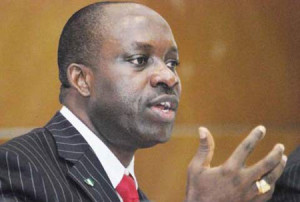
A former Governor of the Central Bank of Nigeria (CBN), Professor Chukwuma Soludo, has blamed the Treasury Single Account (TSA), and other policies of the Federal Government for the country’s inability to avoid the recession.
He stated this while delivering a lecture entitled: “Managing a Recessed Economy”, at the 2017 International Conference organised by the Department of Business Administration of Nnamdi Azikiwe University, Awka, on Thursday.
According to the News Agency of Nigeria (NAN), Soludo said that the recession, which became obvious one year into the life of the present administration would not have degenerated but for the inability of policy makers to rise to the challenge. “Poor ideas transcended over superior ideas, and we went into recession which was slightly avoidable, that is why academics must be alive to their responsibility of nudging us to reality,” he said.
He emphasised that the foundation for the recession was laid by the previous administration, which he said, borrowed to fund recurrent expenditure at a time when oil prices were as high as over $100 to a barrel.
However, he faulted the present administration for introducing the TSA, which he said, channelled all public sector funds to the Central Bank of Nigeria (CBN) and stifled the economy further instead of oiling it with liquidity.
He said: “Part of the problem Nigeria is having in its quest to get out of recession was poor policy. Huge spending by government was one of the ways of solving the economic problem, but two wrong steps by government ruined that.
“They brought in the Single Treasury Account (TSA) and channeled funds into one account that did not allow spending, and they also fixed the price of foreign exchange. These are things you do not do.”
He said that managing and exiting a recessed economy was not a rocket science, adding that Nigeria can overcome the current economic setback faster if the government puts in place the right policies.
The former CBN boss said that part of the problem was because Nigeria failed to save funds at a time when there was unprecedented boom in oil prices, but rather engaged in unprecedented borrowing. “If you borrow at a time of boom, what will you do in time of lack? Even my grandmother in the village knows this.
At the same time when we had boom, we had unprecedented unemployment. “The problem with Nigeria’s successive policy makers is that once oil goes up, we take it that it will remain so, and we continue to spend. “But once there is a shock and oil goes down, we just think it is temporary and we start borrowing.
Copyright Ships & Ports Ltd. Permission to use quotations from this article is granted subject to appropriate credit given to www.shipsandports.com.ng as the source.